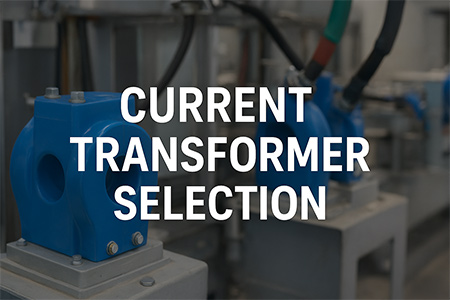Selecting the right current transformer is one of the most important steps in ensuring accuracy, safety, and long-term reliability in modern power distribution systems. Current transformers (CTs) are essential for measuring electrical currents and providing input to protective relays, metering devices, and monitoring systems. With the wide range of applications in substations, switchgear, and transformer installations, a careful selection process can prevent costly errors and improve overall system performance.

One of the first factors to review in current transformer selection is accuracy class. The CT must deliver precise current ratios for both metering and protection purposes. For metering applications, accuracy ensures that energy readings remain reliable, which is essential for billing and operational efficiency. For protective relays, the CT must maintain performance during fault conditions, avoiding saturation that could lead to delayed or missed fault detection. Engineers should always check international standards such as IEC or IEEE to confirm that the chosen CT meets required accuracy levels.
In medium- and high-voltage systems, insulation performance is a key factor. Current transformers must withstand operational voltages without compromising safety. The use of high-grade insulation materials, such as epoxy resin, provides excellent dielectric strength and environmental resistance. Epoxy resin CTs are especially popular in indoor switchgear and outdoor installations because they combine compact structure with long service life.
The secondary load, also called burden, plays an important role in transformer performance. Excessive burden may lead to inaccurate readings, while an undersized CT may fail to drive connected devices. Engineers must evaluate the connected meters, protection relays, and wiring length to choose the proper rated burden. Compatibility with existing systems, including switchgear panels and protection devices, is another consideration during selection.
A well-designed current transformer should provide consistent performance even under harsh conditions. Exposure to humidity, dust, temperature variations, or outdoor weathering can reduce the lifespan of low-quality CTs. That is why many industries prefer epoxy-cast CTs, which offer robust resistance to environmental stresses and require minimal maintenance over years of operation.
Price is always a factor, but the lowest-cost option is not necessarily the best choice. A quality current transformer with stable performance reduces maintenance, improves system reliability, and minimizes downtime. In the long run, such investments often prove more economical than frequent replacement or inaccurate metering.
Putai provides a wide range of medium-voltage current transformers designed to meet the strict demands of today’s power systems. With epoxy resin casting technology, Putai CTs deliver excellent insulation, mechanical strength, and durability. These products are widely used in switchgear, circuit breakers, and transformer installations worldwide. By combining precision with long service life, Putai aims to provide customers with dependable solutions that support both safety and efficiency.
When selecting a current transformer, it is important to balance accuracy, insulation, burden, durability, and cost efficiency. With a trusted supplier such as Putai, engineers and project managers can feel confident that their systems are protected and optimized for long-term performance.